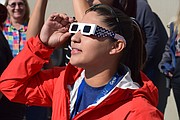Eclipse draws many amateur astronomists outside
MOSES LAKE — Okay, Moses Lake was too far north for a really big eclipse show, but the sun still went dim, at least a little. And those who had special eclipse glasses got to see the moon cover almost all of the sun Monday morning.
The path of the 2017 solar eclipse took the zone of totality through central Oregon, and it was relatively narrow zone at that. It didn’t get dark in central Washington, at least not very dark.
For some spectators it was a little disappointing.
Out at the Port of Moses Lake, a group of Genie employees gathered out front, many with special eclipse glasses and some with welding goggles, to watch the eclipse.
“I was expecting it to be darker,” said one employee who did not wish to give their name as the eclipse reached its peak. The company gave its employees around 10 minutes off at 10:20 a.m. so they could all go see eclipse if they wanted to.
“We went to the Seahawks game on Friday and there was miles and miles of traffic going down to Oregon,” said Naomi Villa. “It wasn’t moving.”
“Maybe I’ll sleep through the next one,” another Genie employee said, unimpressed with the spectacle.
There were cookies and a presentation at the Moses Lake Public Library, and eclipse glasses - the good ones, the ones that worked - shared between families, friends and strangers.
Moses Lake was at 94 percent totality, not enough to darken the skies. But it was enough to provide an interesting show for people who had the glasses.
“I saw the moon going over the sun. It looks like a half-sun,” said Nolan Crawford, who watched the eclipse at the library.
“It’s getting way more crescent,” said another viewer, watching from the library lawn (and with proper eye protection). As the eclipse went on, “the sun was getting more crescent, like the moon,” said Aiden McMillan.
And indeed, as it approached 94 percent eclipse, when looked at through the glasses the sun looked more and more like a crescent moon. The sunlight did get a little dimmer, but it stayed bright enough that some of the most spectacular effects passed Moses Lake by.
But as totality passed, Aiden had one concern. “Is the sun going to come back normal again?” he asked. It did; by noon it was all over.
Cheryl Schweizer can be reached via email at education@columbiabasinherald.com.





